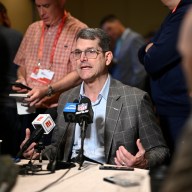By Brendan Pierson
NEW YORK (Reuters) – A U.S. jury on Friday awarded $70 million to the family of a boy who developed breasts after taking Johnson & Johnson unit Janssen Pharmaceuticals’ antipsychotic drug Risperdal. The jury in the Philadelphia Court of Common Pleas found that the company failed to warn the boy’s healthcare providers about the risk of gynecomastia, which is breast growth in men or boys caused by a hormonal imbalance, and that it intentionally falsified, destroyed or concealed evidence in the case, according to a copy of the verdict form provided by a spokesman for the law firm Arnold & Itkin. Andrew Yount, of Tennessee, developed gynecomastia at the age of five as a result of taking Risperdal, his lawyers say.
Yount’s case is one of many similar cases consolidated in the Philadelphia court. Several others have resulted in jury verdicts, but Friday’s verdict dwarfs the next largest of $2.5 million. Other cases are also expected to go to trial, Yount’s attorney, Jason Itkin, said in his statement.
Johnson & Johnson and Janssen are facing more than 12,000 claims over Risperdal, according to Johnson & Johnson’s most recent quarterly report.
Janssen spokeswoman Kristina Chang said in an emailed statement that the verdict was “clearly excessive” and that the company would ask the court and, if necessary, an appeals court to review it. Risperdal was approved by the U.S. Food and Drug Administration in 2002 to treat schizophrenia, but was not cleared for use in children until 2006.
In 2013, Johnson & Johnson and Janssen paid more than $2.2 billion to resolve civil and criminal investigations by the U.S. Department of Justice into its marketing of Risperdal and several other drugs. Prosecutors said that from 1999 to 2005, Janssen promoted Risperdal for uses not approved by the FDA, including behavioral disturbances in elderly people with dementia and attention deficit hyperactivity disorder and autism in children, despite knowing of its risks. (Reporting By Brendan Pierson in New York, Editing by Alexia Garamfalvi, Nick Zieminski and Bernard Orr)

















